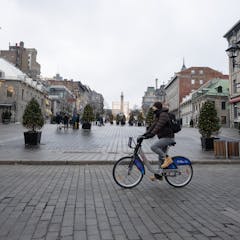
Articles on Sustainability
Displaying 1 - 20 of 692 articles

New research suggests educators can play a crucial role in changing attitudes and actions about food waste and equip future marketing professionals with the tools to tackle sustainability challenges.

Food waste is a serious emergency in Canada and around the world. Here are four practical steps we can take this Earth Day to eat more healthily, reduce food waste and save the planet.

Ballooning inventories are to blame for much of the fashion’s sector carbon footprint. Could on-demand production solve such problems?

West African designers produce only the clothes that are needed, preventing waste and allowing space for creativity.

Coastal fishing communities in west Africa face increased poverty as fish stocks decline.

Controversies haunt Indonesia’s ambition for nickel processing. It’s time Indonesia move away from supplying electric vehicle battery material narrative and focus on sustainability.

Not all types of ground are the same and understanding how varied ground types react to environmental stresses is key to achieving true sustainability.

We could make our hot cities cooler with white roofs and light roads. But progress has been glacially slow.

We know fast fashion is bad for the environment. Ultra-fast fashion makes matters worse. This disturbing trend towards disposable clothing is the opposite of sustainable. Here’s what must be done.

Next time you do your laundry, think like an astronaut – wash your clothes as little as possible.

In the face of growing social and environmental challenges, organizations in the food and agriculture sector are increasingly turning to nature for inspiration.

Climate change is often seen as solely a technical problem. This is a misguided belief. Understanding how to build a better world begins, and ends, with understanding the societies which inhabit it.

Will it make a difference when companies have to track and report emissions and environmental impact? Only if policies with teeth follow.

This obsession with economic growth is destroying our planet. We must rethink private ownership of land – that’s where it all went wrong.

For years, Australia and New Zealand have been united in working for sustainable fishing in the South Pacific. That just changed.

Many incentive programs promote e-bike use, but they aren’t necessarily targeting the right people for the right reasons.

Agricultural sustainability is as much about power and sovereignty as it is about soil, water and crops.

Knowing which fish to buy can be confusing, but certain eco-labels can help decipher whether wild-caught, farmed or organic salmon is best for the environment.

How to really get to know your clothes.

Research shows that rain and hilly terrain doesn’t put people off e-bikes.
